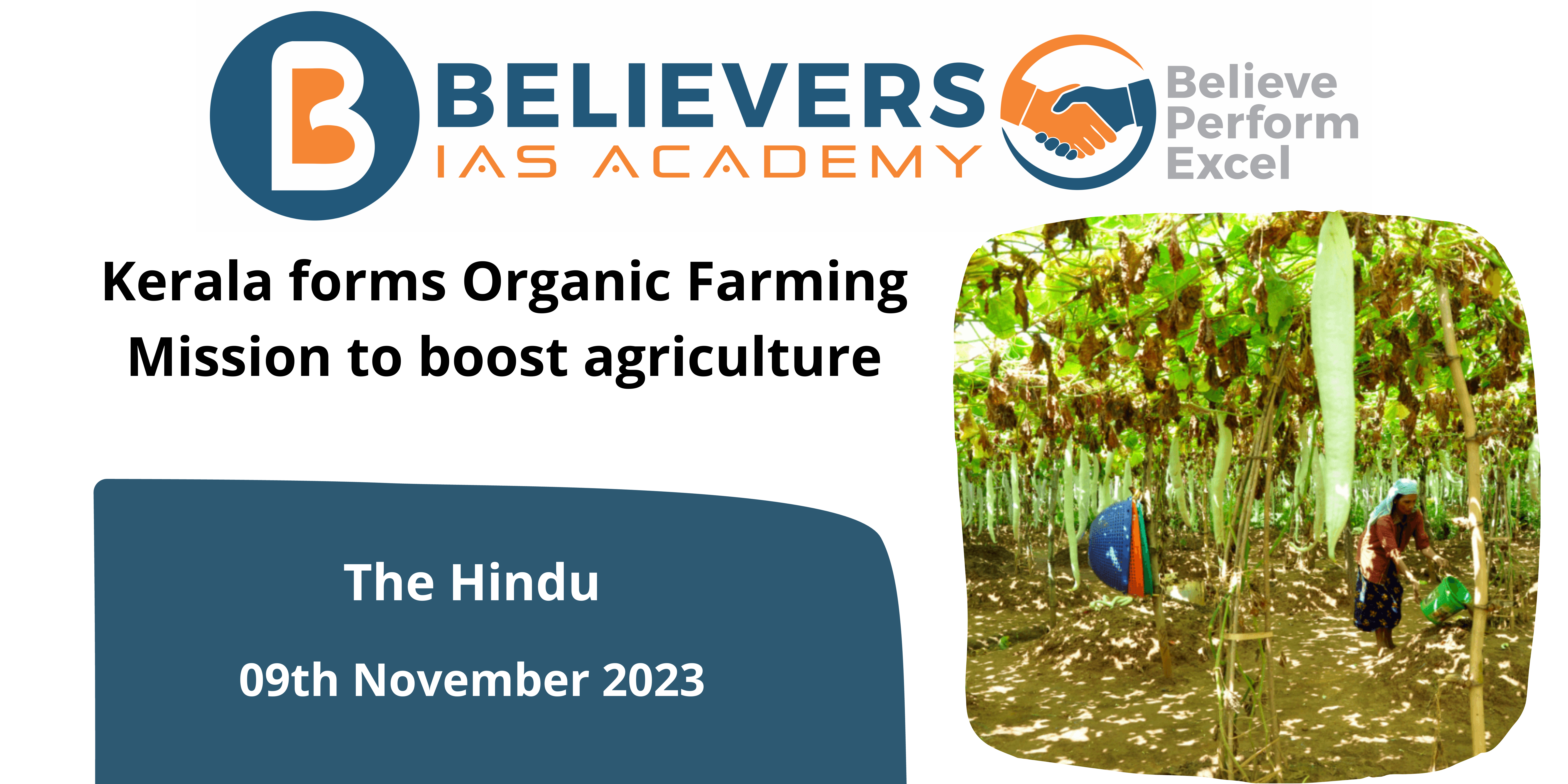Kerala forms Organic Farming Mission to boost agriculture
Context
The Kerala government has established an Organic Farming Mission to promote the use of sustainable organic and climate-smart farming practices throughout the state. The goal seeks to grow organic farming to 5,000 hectares over the next five years, with a 1,000-hectare annual target.
What is Organic Farming?
Organic farming is a method of cultivating crops and rearing livestock that does not rely on synthetic chemicals or pesticides. Organic farming, on the other hand, employs natural practices such as:
- Water that is free of chemicals
- Organic fertilizers
- Natural insect control
- Green manure
- Manure composting
- Rotation of crops
- Intercropping
- Biological pest management
Organic farming began as a reaction to the environmental harm caused by the use of chemical pesticides and synthetic fertilizers. As of 2020, approximately 1.6% of the world’s agriculture was grown organically.
What is the initiative started by the Kerala State Government?
- The creation of the Organic Farming Mission by the Kerala government is a significant step towards promoting sustainable and environmentally friendly agricultural practices in the state.
- The mission’s principal purpose is to encourage and grow organic farming in Kerala. Within the next five years, the mission hopes to expand organic farming to 5,000 hectares. To that end, an annual goal of converting 1,000 hectares of farmland to organic farming will be set.
- At least 10% of farmland owned by the Agriculture Department will be dedicated to organic farming. This integration ensures that agricultural lands held by the government contribute to organic farming methods.
- The mission emphasizes the importance of maintaining organic farming practices over time. Beneficiaries and farms involved in organic agricultural programs are obliged to maintain these practices for at least five years.
- The goal underlines the importance of organic agricultural products from Kerala being certified, labelled, and promoted. This will make it easier for consumers to identify and trust the state’s organic products. The organic agricultural protocol will adhere to national and international standards.
What are the benefits of organic farming?
- Environmental Benefits:
-
-
- Reduced Chemical Use: Organic farming avoids or drastically minimizes the use of synthetic pesticides, herbicides, and fertilizers, which can be damaging to the environment, wildlife, and aquatic ecosystems.
- Soil Health: Organic techniques increase soil health by promoting natural nutrient cycling, beneficial microbial activity, and improved soil structure.
- Biodiversity: Because organic farms eliminate chemical inputs that can harm non-target organisms, they frequently sustain greater biodiversity, with more diverse plant and animal species.
-
- Health Benefits:
-
-
- Organic produce often has lower pesticide residues, which can lead to less exposure to potentially dangerous chemicals.
- Organic crops may have slightly greater nutrient levels and antioxidants, which may contribute to improved health, according to certain research.
- GMO-Free: Organic farming restricts the use of genetically modified crops, giving consumers the option to avoid GMOs.
-
- Sustainability:
-
-
- Organic farming approaches often consume less water, decrease soil erosion, and promote effective resource use, all of which contribute to long-term sustainability.
- Climate Resilience: Because organic farms prioritize soil health and biodiversity, they may be more resistant to climate change. This can aid in water retention and insect resistance.
-
- Pollution reduction:
-
-
- Organic farming reduces pollution in waterways, air, and soil by avoiding the use of synthetic chemicals.
-
- Economic Advantages:
-
- Farmers can benefit financially from organic farming since organic products attract higher market prices.
- It may also minimize farmers’ reliance on costly synthetic inputs.
What are the challenges faced by the Organic farming sector?
- Lower Yields: Due to the limited use of synthetic pesticides and fertilizers, organic farming often yields less per unit of land than conventional farming. Farmers may face financial difficulties as a result of this.
- Pest and Disease Management: Organic farming relies on natural or organic pest and disease management measures, which can be less effective and time-consuming than chemical alternatives.
- Weed Control: Controlling weeds without synthetic herbicides can be difficult. Organic farmers frequently use labour-intensive mechanical and hand-weeding methods.
- Transition Period: When transitioning from conventional to organic farming, the land must conform to organic methods, but the produce cannot be sold as certified organic. This can lead to lower earnings for a few years.
- Costs of Certification: Organic certification can be costly, with fees and documentation requirements. These fees may be prohibitively expensive for small-scale producers.
- Market Access: It might be difficult to gain access to markets for organic products since they may require special certifications and quality criteria.
- Price Volatility: Because of lesser production volumes and market volatility, organic product prices can be more volatile than conventional product prices.
Conclusion
Overall, the Kerala Organic Farming Mission is a comprehensive strategy for encouraging, supporting, and expanding organic farming methods in the state. Its goals are to assure farmers’ long-term commitment to sustainable agriculture, to build a strong certification and branding system, and to provide value to organic products for the benefit of both farmers and customers. This objective is consistent with the global shift toward ecologically responsible and sustainable agriculture practices.




